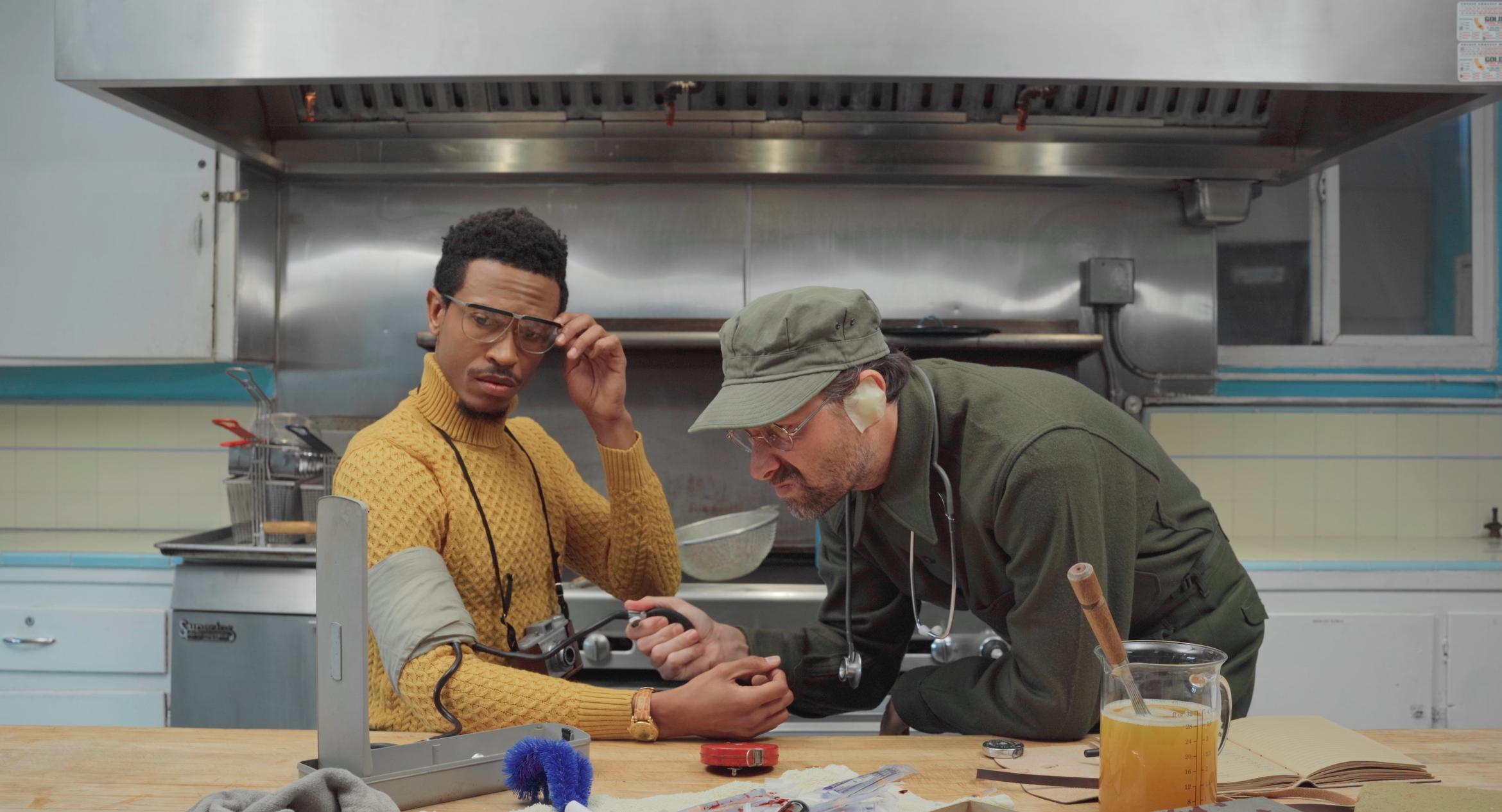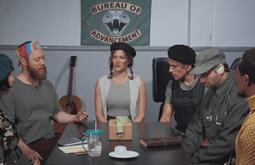Comic Release is a three-part podcast series hosted by artist Joe Jowitt which explores the use of humour in artists' moving image.
In this conversation, Joe meets Tāmaki Makaurau Auckland-born, Los Angeles-based artist and filmmaker Sean Grattan, whose debut feature film, Policy Wonks, explores the clash of liberal ideologies through an absurd intersection of "money, guns and yoga." Joe and Sean discuss using slogans as dialogue, working with clichés, and deprogramming problematic humour from one's own cultural upbringing.
List of Topics
00:00: Introduction
02:00: Joe asks, "Where did the ideas in Policy Wonks come from?" Sean discusses yoga, and the idea of a personal practice that radiates to the world; classic ideas that characterise left and right politics; and different strands of liberalism.
04:30: A description of the major plot and character outlines of Policy Wonks, and their respective political positions.
06:08: Audio excerpt from Policy Wonks.
07:00: Sean discusses the difference between political and economic liberalism.
09:00: Joe asks, "How did the project evolve over 12 years?" Sean discusses writing dialogue from a series of ideas and slogans, as opposed to plot; working from the position of an artist rather than a dramatic scriptwriter; and the emergence of a plot in the writing process. The film as a critique of rationalism.
11:20: Audio excerpt from Policy Wonks.
11:45: Joe on what makes the Bureau of Advancement funny—the combination of radical ideas and deadpan delivery. Sean on leaning into "the synthetic-ness of acting." Sean discusses examples of this synthesis, such as juxtaposing slogans and dialogue: "The point is just to try and give representation to these dilemmas that I've perceived."
14:30: Sean cites the dialogue, "How do we care for others while mostly caring about ourselves?" as an example of a societal dilemma. Sean on the humour and terror of the line, "Innocent people in foreign lands often need to die so that we may keep living," and how this concept plays out in real-world nation state politics. "Bombs for Humanity." The example of US military action in Libya during Obama's presidency.
17:30: Joe on how the cognitive dissonance in the film creates the humour: " the explosion of them coming together, it's sort of the cliché of, if I didn't laugh, I'd cry."
18:00: Audio excerpt from Policy Wonks.
18:38: On the character of Major: "a pretty simple inversion … of the macho character," whose hyper-masculinity is undermined by his tiny gun. Sean on the use of cliché as a motif in his practice. On guns as an emblem of personal liberty in the US.
21:40: Sean on the practical, budgetary concerns that affected the content: " I want to examine what happens when someone gets shot. But also I can't afford to have a massive makeup team … so the gun wound is going to be very small." On researching gunshot wounds. The synthesis of critique and practicalities.
23:20: Sean on humour being related to superiority and being "in on the joke." On the humour and content in the film being juxtaposed with Sean’s own " plain earnest concerns that I have as a human." The limits of one's personal agency in the world.
25:30: Joe: " Is [the humour] creating a kind of protective distance or a more intimate connection for the audience?" Sean describes a line he finds hilarious that never gets a laugh: "Are we pre-equal opportunity?" Sean: " I was like, this is funny as shit. But no one laughs." Sean discusses different responses from US and NZ audiences.
27:22: On growing up in Aotearoa New Zealand and being exposed to pop culture from the US.
28:00: Joe asks about the current situation in the USA: " Has your relationship with the thematics of the film changed since it was finished?" Sean discusses "the moral underpinning of liberalism … [as] a system that is built upon already existing inequalities." Liberalism’s emergence from the Enlightenment, and its opposition to universal moral values. The relationship between individual liberty and the marketplace. Sean relates this to current political crises and the breakdown of the American-led global order: "It's like a breakdown of our ability to agree on shared values … everyone's pulling up the drawbridge, drawing lines in the sand and making the case for their own little fiefdoms." The rise of Globalism in the 1990s, the subsequent backlash, and the influence of racist ideas in shaping the current moment.
33:00: Sean on the historical emergence of the concept of human rights. Nation states, the lack of rights awarded to non-citizens. "How is society shaping our very psyche?"
35:16: Joe asks, "How do you approach that in Policy Wonks?" Sean on the line " Sometimes I feel alienated and vulnerable."
37:10: Audio excerpt from Policy Wonks.
38:30: On Freud’s 'joking envelopes' and how humour is now being weaponised in the US. Elon Musk’s line "You can’t joke about anything anymore" as prejudice hiding in plain sight. The paradoxes of Bill Burr's comedy: " He has this sort of grumpy white guy persona … but he has this self-deprecating element, which I think does reveal his humanity, even though he's stepping right up to the line."
40:50: Sean on unlearning or deprogramming one's own cultural embedding of problematic humour.
42:00: Joe asks, "Has the experience of making Policy Wonks changed your relationship to civic life or wellness practices?" Sean on living in the US, parenthood, becoming "more and more clear what my values are" and "trying to find calm" through meditation.
43:30: Joe: "I'm interested in what the film offers as a proposition for what to do." Sean discusses the last scene, which features the teacher character and the question: " How do we not harm other people [and] still thrive and survive as our own beings?" Sean: "Instead of being programmatic with regards to a political operation, I wanted to focus on available means within your immediate circle." He discusses reiki in the film: "I’m not suggesting that reiki can cure bullet wounds … but there’s faith required in order to leap forward into some other framework that requires invention." Sean on practicing care and repair.
48:20: End.


-circuit.jpg)
,-part-of-the-wastelands-(2024).-installation-view,-auckland-art-gallery-toi-o-tamaki,-2025.-image-courtesy-of-the-artist.jpg)